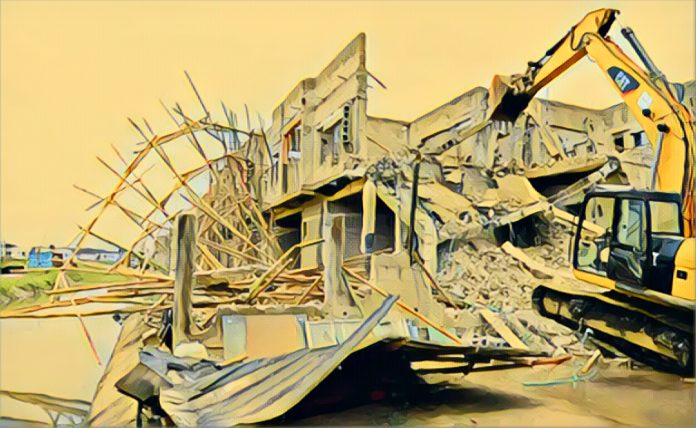The Lagos State government has resumed its campaign to dismantle illegal structures constructed on canals and drainage setbacks within the Ikota drainage channel in Lekki. This renewed effort to address the persistent issue of flooding in the area was confirmed by Kunle Adeshina, the spokesperson of the Lagos State Ministry of the Environment, via a tweet.
The operation aims to completely clear the drainage setback along the Lekki 2-Ikota channel, further demonstrating the state government’s commitment to mitigating the recurrent flooding challenges faced by residents.
The initial phase of the demolition, which commenced on October 14, resulted in the removal of houses that had been built on the drainage channel. While this exercise has been instrumental in reducing the risk of flooding, it has also left many residents without homes as their properties were affected by the demolition.
Crucially, the state government has clarified that it will not provide compensation to the owners of the demolished structures. This decision is grounded in the fact that these property owners had been duly informed that their constructions were obstructing the free flow of rainwater into the drainage systems.
The resurgence of this operation underscores the government’s determination to maintain the integrity of drainage systems and reduce the vulnerability of communities to flooding, especially during the rainy season. While the demolitions may have caused inconvenience and displacement for some residents, the long-term objective is to enhance the overall resilience of Lekki and surrounding areas to flooding incidents.
As the government continues to prioritize flood control measures, it is expected that comprehensive urban planning and sustainable construction practices will play a pivotal role in preventing further encroachments on vital drainage infrastructure. By addressing the root causes of flooding and providing alternative housing solutions where necessary, the government can work toward a more secure and resilient environment for all residents.
This proactive approach demonstrates a commitment to the well-being and safety of Lagosians, as the government seeks to strike a balance between development and environmental sustainability. While the demolition process may present short-term challenges, it ultimately contributes to the long-term security and sustainability of the region, reducing the risk of devastating floods that have plagued the area for years.
Source: [The Guardian]



